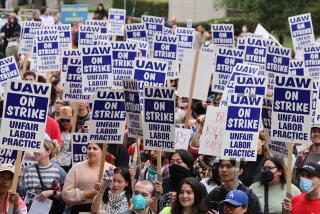Cal State faculty begin voting on strike authorization
California State University faculty began voting Monday on whether to authorize their union to strike after 22 months of talks over salary, class sizes and other issues stalled.
An affirmative vote could result in two-day rolling strikes at the 23 campuses, most likely beginning in the fall, according to California Faculty Assn. officials. The union represents 23,000 Cal State professors, lecturers, librarians, counselors and coaches at the public university system.
The vote comes as Cal State has suffered severe cuts in state funding — $750 million this fiscal year with the potential for an additional $200-million reduction next year if voters fail to approve a tax initiative backed by the governor on the November ballot. The Cal State system has raised tuition, offered fewer courses and turned away thousands of students.
The union, which said the faculty haven’t received raises since 2007, is asking for 1% pay increases for each year of the new contract, more control over class sizes and greater stability for faculty with temporary contracts, among other proposals.
Cal State officials said the union’s demands would cost the system more than $500 million at a time when it can ill afford the additional expenses. They are proposing to maintain current salary levels for 2011-12 with the potential for reopening negotiations for future years if financial conditions improve.
“It’s a matter of fiscal prudence,” Cal State spokesman Mike Uhlenkamp said.
At Cal State Long Beach, dozens of faculty members cast ballots at a booth set up at the student union building. Many wore red T-shirts that read “I don’t want to strike, but I will.”
“This is not a greedy bunch of people,” said Teri Yamada, a professor of Asian studies. “It’s not so much about salaries, but the quality of education being jeopardized by the relentless cuts. It’s really irritating to have executives given raises while they’ve raised tuition on kids. It’s made the faculty really angry.”
The 400,000-student system was forced to tighten compensation policies after the Board of Trustees approved controversial pay increases for several new campus presidents.
The faculty association insists its proposals are modest by comparison.
“The administration has been using us and students as ATM machines in this budget situation,” said faculty association President Lillian Taiz, a history professor at Cal State Los Angeles. “Before they bleed us to death, they need to look at their priorities.”
During a break from classes, Brett Butler, a communications studies major at the Long Beach campus, said he sympathized with some faculty concerns, but thought a strike would be too disruptive.
“It’s threatening our learning experience,” said Butler, 21. “Even if they are only two-day strikes, it takes away from the focus on why students are here.”
The union and Chancellor Charles Reed have failed to reach agreement on key issues since the last three-year contract expired in June 2010. Mediation efforts broke down April 6 and a neutral fact-finder will be appointed to seek a resolution. If no settlement is reached at the end of the process, the union has legal authority to stage a walkout. Voting will occur online and on campus until April 27.
The faculty union staged one-day strikes at two campuses in November over many of the same issues. Those were the first strikes since the union was formed in 1983.
More to Read
Sign up for Essential California
The most important California stories and recommendations in your inbox every morning.
You may occasionally receive promotional content from the Los Angeles Times.











